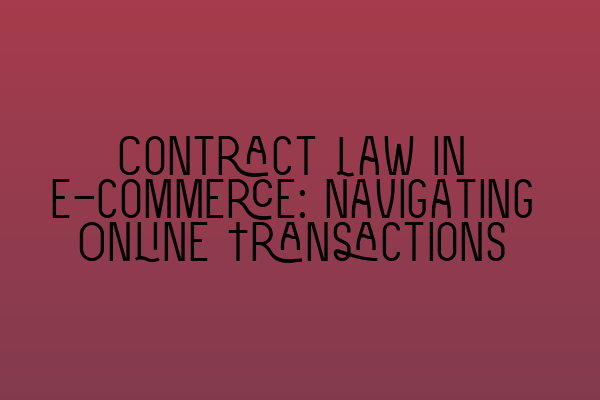Contract Law in E-commerce: Navigating Online Transactions
In today’s digital age, e-commerce has become an integral part of our daily lives. From buying groceries to booking travel, online transactions have made our lives more convenient and efficient. However, with the rise of e-commerce comes the need for a robust legal framework to govern these transactions and protect the rights of both buyers and sellers. This is where contract law plays a crucial role.
What is Contract Law?
Contract law is a branch of civil law that deals with the formation, interpretation, and enforcement of contracts. A contract is a legally binding agreement between two or more parties, which sets out the rights and obligations of each party. In the context of e-commerce, a contract is formed when a buyer and a seller agree to the terms and conditions of an online transaction.
Formation of Online Contracts
Online contracts are generally formed through a process known as “clickwrap” or “browsewrap.” Clickwrap agreements require users to affirmatively click a button or check a box indicating their acceptance of the terms and conditions. On the other hand, browsewrap agreements display the terms and conditions somewhere on the website and assume that users have agreed to them by using the website.
However, the enforceability of these agreements can be complex, as it may depend on various factors such as the presentation and visibility of the terms, the language used, and the level of notice given to users. It’s important for businesses to ensure that their online contracts are properly drafted and prominently displayed to minimize the risk of disputes.
Key Elements of an Online Contract
To ensure the enforceability of an online contract, certain key elements must be present:
1. Offer and acceptance: There must be a clear offer made by one party and an unconditional acceptance by the other party.
2. Consideration: Both parties must exchange something of value as part of the agreement. This could be money, goods, or services.
3. Intention to create legal relations: Both parties must have an intention to be legally bound by the terms of the contract. In an online context, this is usually presumed unless expressly stated otherwise.
4. Certainty of terms: The terms of the contract must be clearly defined and certain so that both parties know what they are agreeing to.
Protecting Consumer Rights
In e-commerce transactions, consumers are often considered the weaker party, as they may lack the necessary knowledge and bargaining power. To address this power imbalance, consumer protection laws have been put in place to safeguard consumers’ rights.
One such law is the Consumer Rights Act 2015, which provides consumers with various rights, including the right to a refund, the right to have goods of satisfactory quality, and the right to have services carried out with reasonable care and skill. It’s important for businesses to be aware of these laws and comply with their obligations to avoid legal consequences.
Resolving Online Contract Disputes
Despite best efforts to create a clear and fair online contract, disputes may still arise. In such cases, it’s advisable to explore alternative dispute resolution methods before resorting to litigation. Mediation, arbitration, and negotiation are some of the options available to parties to resolve their disagreements amicably.
However, if a dispute cannot be resolved through alternative means, parties may have to resort to litigation. It’s important to note that the jurisdiction and applicable law in online contracts can be complex, especially in cases involving parties from different countries. Seeking legal advice from an experienced contract law solicitor is crucial to ensure the proper application of the law and protect your rights.
Conclusion
In today’s digital world, online transactions have become commonplace, and contract law plays a vital role in ensuring the enforceability of these agreements. Whether you are a buyer or a seller in an e-commerce transaction, understanding the basics of contract law can help you navigate these transactions successfully and protect your rights.
At SQE Contract Law, we have a team of experienced solicitors who specialize in contract law and can assist you with all your e-commerce legal needs. Contact us today for professional advice and guidance.
Related Articles:
– SQE 1 Practice Exam Questions
– SQE 1 Practice Mocks FLK1 FLK2
– SQE 2 Preparation Courses
– SQE 1 Preparation Courses
– SRA SQE Exam Dates
